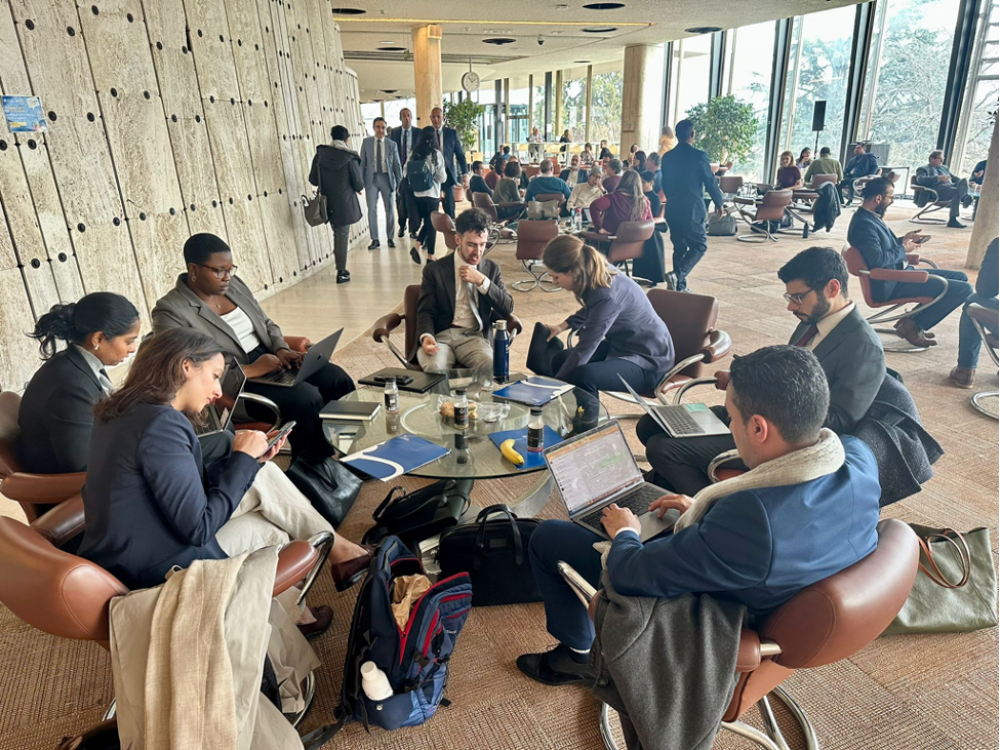Last month, a team from the Sana’a Center for Strategic Studies and The Columbia Law School Human Rights Clinic traveled to UN headquarters in Geneva to advocate for a transitional justice process in Yemen. Transitional justice is the first step in rebuilding broken trust in the rule of law following protracted conflicts. Reconciliation must start with the design and implementation of a functioning victim-centered transitional justice process.
The team called for this crucial reform of the justice system during the Human Rights Council’s Universal Periodic Review (UPR) of Yemen. Yemen will be reviewed on May 1st, when Yemen’s official delegation will present their arguments before the Human Rights Council to address inquiries regarding compliance with human rights laws. Member states of the Human Rights Council conduct a peer review, and make recommendations to expand and protect human rights within the state under review.
“The UPR is a critical part of the international human rights system,” said Professor Sarah Knuckey, the Director of the Human Rights Clinic at Columbia Law School. “It holds governments to account for their human rights obligations. Civil society participation in the UPR ensures that the UN listens to locally-defined human rights priorities.”
The Sana’a Center took this opportunity to discuss the importance of making transitional justice a priority in Yemen. A lasting peace is impossible without justice. Unresolved disputes will result in cyclical violence, and peace agreements without accountability will inevitably disintegrate.
“Political elites are ignoring the needs and priorities of communities harmed by a decade of war in Yemen,” said Yasmeen al-Eryani, the Co-Executive Director for Knowledge Production at the Sana’a Center for Strategic studies, Yemen’s leading think tank. “Affected communities deserve peace and human rights, and transitional justice in Yemen must be designed in a victim-centered way.”
The team also shared with the UN and member states their research on the correlation between armed conflict, environmental harms, and climate change. Climate change is a threat multiplier, and there can be no sustainable peace without taking into account the environmental drivers and impacts of conflict.
“Elites say that preparing for climate change is a luxury,” said Yazeed Al Jeddawy, Research Coordinator at the Sana’a Center for Strategic Studies. “But people in Yemen, rural populations, farmers, fisher men and women, they are already experiencing the impacts and they need solutions now. The capital of Yemen, Sana’a, is likely to run out of water within the next ten years. Urgent action is needed.”
The Clinic and the Sana’a Center have been research and advocacy partners for nearly a decade. They bring together their complementary expertise in Yemen and political analysis, and international human rights, to conduct innovative research and advocacy to improve human rights and peace in Yemen. Their current work focuses on climate and transitional justice. Prior work has examined the impacts of war on mental health.
The Sana’a Center for Strategic Studies is an independent think tank that seeks to foster change through knowledge production, with a focus on Yemen and the surrounding region. The Center’s publications and programs, offered in Arabic and English, cover political, social, economic, and security developments, aiming to impact policy locally, regionally, and internationally.
The Smith Family Human Rights Clinic at Columbia Law School trains students to be leaders in human rights advocacy. Students work on social justice advocacy around the world, in partnership with civil society, communities, and those directly affected by abuse.

